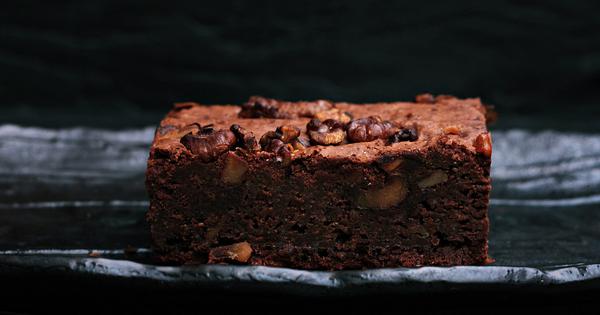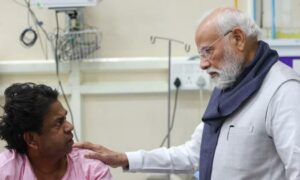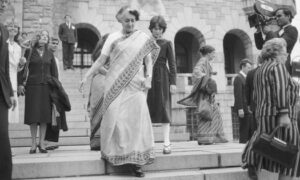
Returning to Kolkata from Delhi one morning a year or so ago, I stopped at Delhi airport at an outlet whose fame I had encountered only on social media. Theobroma is a Mumbai-based confectionery, and had not made its presence felt in Kolkata yet, a city already strong in this segment with both contemporary bakeries like Kookie Jar and its spinoff, Cakes, as well as heritage bakeries like Flury’s, Nahoum, and Saldanha all catering successfully to a public that likes its cakes.
I needed a coffee and, spotting a Theobroma kiosk at a prominent junction leading to the departure gates, thought it a good occasion to check out their reputation by asking for a brownie along with the coffee to take on to the flight.
In the way that one always thinks happens only to oneself, I was preceded in a split second by a lady with her teenage son in tow, and waited behind her to be served, worrying about the boarding time. Apparently the boy had the same worry, which he voiced to his mother, who peremptorily and loudly told him not to worry, beta, because they were in business class.
This was followed by a seemingly endless number of pastries, cake slices, and other goodies being packed into two large boxes by the polite youth serving her, all accompanied by the demand, repeated many times over, that all of the contents of the boxes should be “eggless”.
After she had finished, I asked for a brownie and coffee and was proceeding to the till to pay when I suddenly wondered if all this repetition of “eggless” had had any effect on my order and thought it prudent to ask whether my brownie was “eggless” too. Sure enough, I was told it certainly was.
I immediately asked him to please change it for a normal brownie, and couldn’t resist also informing him that the default option for a brownie should always be the normal one, because an authentic brownie would always be made with egg.
Eggless Brownie Cupcakes – Baking these beauties is therapeutic . What do you think ?
Recipe Link : https://t.co/Kbl60QwYQF#EgglessBakes pic.twitter.com/kp6ZVoOx7I
— Sanjeev Kapoor (@SanjeevKapoor) July 17, 2018
Looking up the history of the brownie subsequently, I am informed by Wikipedia and AI that legend has it that the dessert was invented in Chicago in 1893 and that it consists of chocolate, flour, eggs, and butter – the basic ingredients for most cakes. This made an entire range of deliciousness historically inaccessible to vegetarians, and the invention of the powder that replaces the egg in cakes must have been a great development for a whole constituency of cake lovers.
Eggless confectionary and cakes are not commonly found anywhere else in the world, catering exclusively to a peculiarly Indian demand and as such was a welcome development. Today, however, it has begun to replace the regular old brownie or chocolate cake at an alarming rate and in the most routine way, at least in this city.
A few years ago, for instance, I discovered that even the five-star Taj Bengal hotel had stopped making normal chocolate cakes, which was a pity, because they used to make a good one. All you got, if you cared to ask, was an eggless variety that looked beautiful but didn’t taste the same.
If you asked the chefs, they apologised and said they are bound by customer preference and demand, or suggested pre-ordering with the specification that it should not be eggless, which was disheartening.
The Bengali in me, alarmingly, rebels against this particular development quite strongly. Bengalis are famously non-vegetarian in their food habits – growing up in a middle-class home, no meal is considered complete without fish, meat or at least an egg to complete it.
Jokes proliferate about how Navratri means seven days of vegetarian food twice a year for the rest of India while the Bengali, who generally knows just one Navaratri at Durga Puja, will be planning meals from biriyani to chicken rolls for the various days of the same period.
I have seen a Bengali passenger sitting next to me at the back of a plane explode in indignation when informed by an Air India air-hostess a few years ago that the non-vegetarian meal was not available anymore – this deprivation was obviously keenly felt. I have felt a similar deprivation myself when watching movies at Inox, which routinely forces all non-vegetarians into vegetarianism for the duration of the film at least here in Bengal.
Just had a message from a God fearing friend saying she won’t be coming over till the end of #Navratri, “Can’t eat your brownies so no point,” she says, guess she’s right since I’m never going to bake an eggless brownie, and she only visits me to eat my brownies! pic.twitter.com/LfTeOZdByj
— Ritu Bhatia (@rituontherun) October 21, 2020
In relation to the brownie or cake, however, this was not a craving for a non-vegetarian food item but a demand for recognition of the fact that a brownie or chocolate cake tastes better if made in the traditional way. It’s incidental that this demand has to be phrased in terms of authenticity.
My insistence on an authentic brownie seemed alarming because the authenticity argument, when applied to culture, evokes an equal and opposite reaction in me.
Writing about Bengali literary culture in the nineteenth century, I have quoted from the philosopher Kwame Anthony Appiah’s Cosmopolitanism: Ethics in a World of Strangers, where he mentions that the word by which Roman men of letters referred to the playwright Terence’s mode of writing was “contamination” because Terence, an African writer of Latin comedies in imperial Rome in the late second century AD, freely incorporated earlier Greek plays into his Latin productions.
One of Terence’s observations, “So many men, so many opinions”, is reminiscent for Bengalis almost immediately of the savant Ramkrishna in nineteenth-century Calcutta saying “jata mat tata path” (“there are as many paths as there are opinions”).
Appiah speaks up for what he calls “contaminated cosmopolitanism” as a “counter-ideal” to those who would protect “their authentic culture”, arguing, instead, that “cultural purity is an oxymoron”. Scholars on interculturalism have suggested that “cultures are always already intercultural”, regardless of the demand by cultural purists either for one language or for a pure language shorn either of Persian words (as demanded for Bengali literature by Dineshchandra Sen) or of English (as argued later by so many that it became a particular form of mockery by elders if they found you relying on English in a Bengali conversation).
If culture, then, should not be premised on authenticity, should the brownie?
Rosinka Chaudhuri is the author most recently of India’s First Radicals: Young Bengal and the British Empire.
📰 Crime Today News is proudly sponsored by DRYFRUIT & CO – A Brand by eFabby Global LLC
Design & Developed by Yes Mom Hosting






